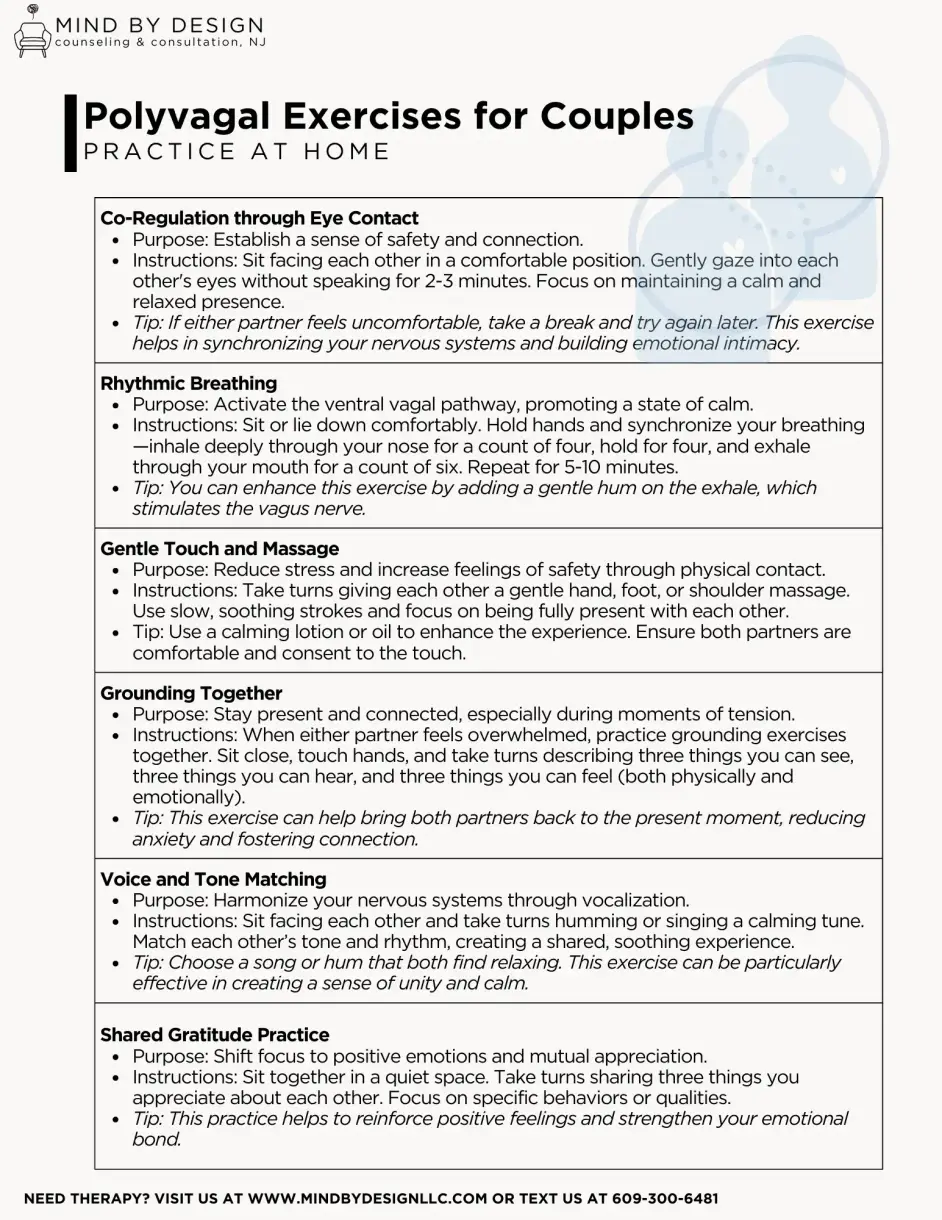Polyvagal Exercises for Couples: Emotional Intimacy & Co-Regulation
Polyvagal theory offers a unique lens to understand our autonomic nervous system’s responses, influencing our emotional and physical states. When combined with Emotionally Focused Therapy (EFT), these insights can significantly enhance emotional connection and intimacy in couples. This guide provides exercises to help couples regulate their nervous systems and strengthen their relationship.

What is Polyvagal Theory?
Polyvagal theory, developed by Dr. Stephen Porges, provides profound insights into how our autonomic nervous system (ANS) responds to safety and danger cues. By understanding these responses, couples can enhance their emotional connection and create a secure attachment bond. This blog complements your one-page guide on polyvagal exercises for couples, offering a deeper dive into each exercise and additional tips for implementation.
Benefits of Polyvagal Exercises for Couples
Polyvagal exercises offer a wealth of benefits for couples, enhancing both their emotional and physical connection. Here’s a closer look at how these practices can positively impact your relationship:
Enhanced Emotional Intimacy
By engaging in exercises that promote calm and connection, couples can deepen their emotional bond. These practices foster a sense of safety and trust, essential for intimate relationships.
Improved Communication
Many polyvagal exercises require non-verbal communication and synchronized actions, which can improve overall communication skills. Couples learn to read each other’s cues better, leading to more effective and empathetic interactions.
Stress Reduction
Polyvagal exercises often involve rhythmic breathing, gentle touch, and grounding techniques that lower stress levels. Reduced stress can lead to fewer conflicts and a more harmonious relationship.
Better Conflict Resolution
When couples feel connected and calm, they are better equipped to handle disagreements. Polyvagal exercises can help partners stay grounded and approach conflicts with a more balanced and compassionate mindset.
Increased Resilience
Regular practice of these exercises builds emotional resilience, helping couples to better support each other through life’s ups and downs. This resilience strengthens the relationship, making it more robust against external stressors.
The Nuts & Bolts of Polyvagal Exercises for Couples
Polyvagal theory explains how our ANS, comprising the sympathetic (fight or flight) and parasympathetic (rest and digest) systems, responds to external cues. The theory highlights the role of the vagus nerve, which influences our physiological and emotional states. Understanding this can help couples foster safety and connection, crucial for a healthy relationship. Polyvagal exercises tap into the body’s natural mechanisms for creating a sense of safety and calm. Here’s how they work to benefit couples:
Activating the Ventral Vagal Pathway
This part of the autonomic nervous system is responsible for social engagement and connection. Exercises like eye contact and rhythmic breathing stimulate this pathway, promoting feelings of safety and bonding.
Co-Regulation
Couples can help regulate each other’s nervous systems through synchronized activities. When one partner is stressed, the other can provide calming support, helping both to return to a state of calm and connection.
Promoting Mindfulness
Many polyvagal exercises require mindfulness and present-moment awareness. Practicing mindfulness together enhances emotional attunement and empathy, which are critical for a healthy relationship.
Physical Touch and Proximity
Gentle touch and close physical proximity activate the body’s calming responses. These activities release oxytocin, a hormone that promotes bonding and reduces stress.
Creating Rituals of Connection
Incorporating these exercises into your routine creates rituals that reinforce your bond. These shared practices become a foundation for ongoing emotional intimacy and support.
Polyvagal Exercises for Couples In a Nutshell
Regularly practicing these polyvagal exercises can help couples create a sense of safety, connection, and emotional intimacy. By integrating these practices with the principles of polyvagal theory and EFT, couples can better understand and support each other’s emotional and physiological needs. This holistic approach can enhance your ability to co-regulate and navigate life’s challenges together, fostering a resilient and loving relationship.
FAQ's About Therapy in New Jersey
Where are you located? I need a therapist near me
We are fully online, which means that your therapy sessions will be help via video call on our HIPAA compliant Platform. Anyone in New Jersey can access our therapy services
How do I get started as a new client?
New Clients can reach out to us directly via call, text or email here:
Does my insurance cover my visits?
We provide”Courtesy Billing” for clients who are using the Out-of-network insurance benefits.
Our Insurance Page might answer your questions about your insurance information, cost and OON coverage.
What are out-of-network benefits?
Visits our FAQ About Insurance to learn more about OON coverage for mental health services. We can also check your benefits for you. When using OON benefits, patients typically pay the full cost of the treatment upfront and then file a claim with their insurance company for reimbursement.
Is Online Therapy As Effective As In-Person Therapy?
Online therapy is essentially face-to-face counseling, just conducted remotely. Studies show that tele-therapy is as effective as traditional counseling. Professional organizations and state governments recognize its benefits and have set regulations for it. However, like any therapy, its success in achieving your goals isn’t guaranteed. It’s important to discuss with your therapist whether tele-therapy is working for you.
How Should I Prepare for My First Session?
Showing up is all that you need to do! But if you really want to get the most out of session, it could help to take some time to think about what you want from therapy. It helps to write down your goals, questions you have or things that you feel are important to share.
Do you offer traditional talk therapy?
of course! though we have some unconventional therapy approaches, we are rooted in evidenced based practices. Talk therapy is a major player in the therapy room! See What we Treat and Integrative Services for more information
Is Virtual Counseling Suitable for Everyone?
Online therapy might not be as effective for individuals with chronic suicidal thoughts, severe trauma, significant mental health history, or those recently in intensive care. Such cases often benefit more from traditional, in-person counseling. We’ll help you decide if our online services are right for you during your intake and evaluation.
Can I Change Therapists If I'm Not Happy?
Yes, you can switch therapists to another provider within the practice, or we can provide you a referral if preferred. We want to ensure that your time and effort are well spent, and that you are getting the relief you need, that’s why we work collaboratively with each other in the practice, as well as outside therapists who we know and trust.
How Do I Know If Therapy Is Helping?
You should feel like you’re making progress. Signs it’s working include:
- Feeling comfortable talking to your therapist
- Your therapist respects boundaries
- You’re moving towards your goals
- You feel listened to
You’re doing better in life - Your self-esteem is getting better
What is your cancellation policy?
We ask that clients provide at least 24 hours notice in the event that they need to cancel to avoid the 50% cancellation fee. we understand that life happens and do our best to be flexible & reschedule.
What Geographic Areas Are Served?
Currently, we serve clients in New Jersey and are expanding to other states as telehealth laws evolve. While telehealth offers the convenience of attending sessions from anywhere, state laws require clients to be in-state during their session.
Is Online Therapy Easy to Use for Non-Tech-Savvy People?
Yes, it’s pretty simple to access sessions. You’ll need basic internet skills, such as opening and visiting the patient link sent to you via email. It’s similar to video chatting like Facetime or Zoom. We can also walk you through it on the phone the first time to ensure a strong connection
What Questions Should I Ask My New Therapist?
Feel free to ask anything. Some good questions are:
- How often will we meet?
- What do you specialize in?
- What experience do you have with my issue?
- What outcomes can I expect?
- How will I know I’m progressing?
- How long do you usually work with clients?
- How will we set my treatment goals?
What is the difference between associate therapists & fully licensed therapists?
Our Qualifications:
Our founder, Rebecca Sidoti, is a highly qualified, state-licensed therapist and supervisor with extensive training in anxiety related disorders and innovative treatment such as Ketamine Therapy. Mind by Design Counseling adheres to standards set by the our governing counseling boards.
To see each providers credentials, training and licenses, visit our “Meet the Therapists” Page to learn more.
- LAC/LSW are therapists who may practice clinical work under the supervision of a fully licensed therapist.
- LPC/LCSW are therapists who have completed the necessary clinical hours post-graduation under supervision and can practice clinical work independently.







